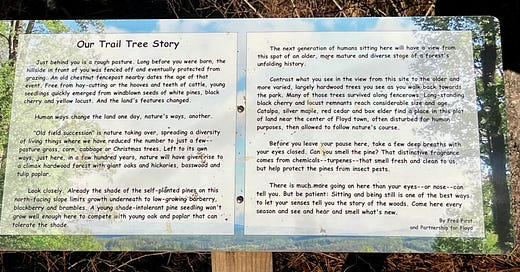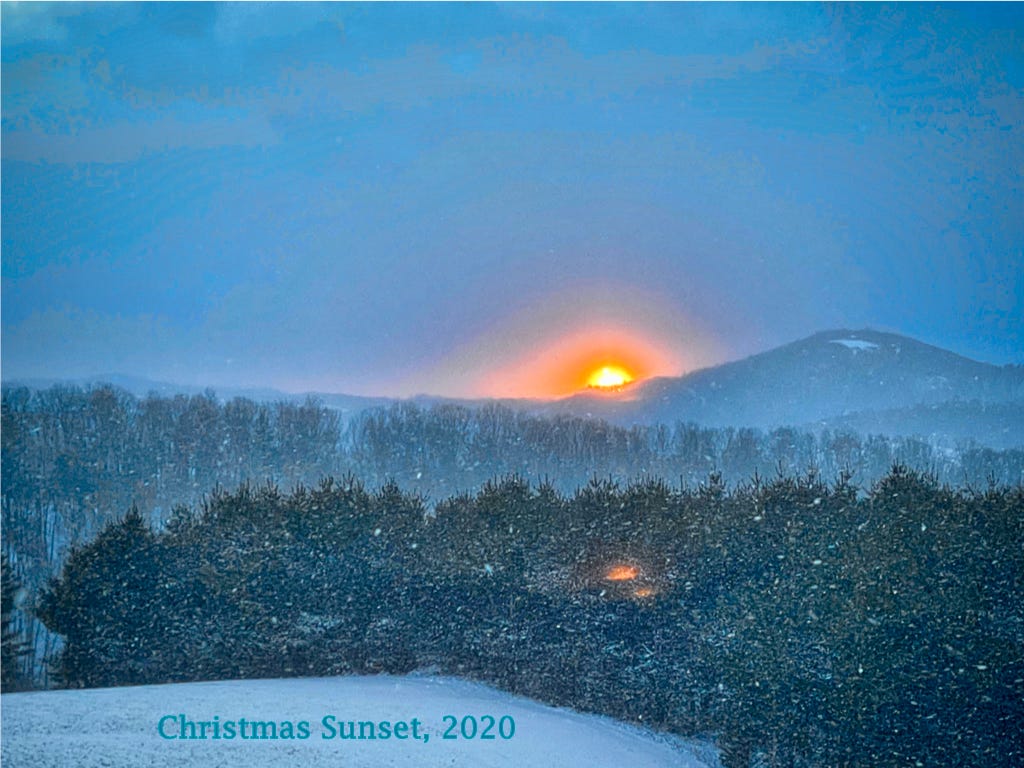Despite the ice and snow outside this morning between Kansas City and St. Louis, it already feels like we’ve turned the corner towards spring. The days are getting longer, if not warmer. And the thought of my first spring in the natural places of central Missouri is causing the vital humors to pulse again, ever so slightly.
And I have a congested backlog of conversations I should have with myself (and share some here). Now, having turned to Janus’s face that looks through the door to what comes next, let’s get moving! I promise to be more regular, and perhaps more thoughtful and intentional with this space.
That said, the park trail sign image below was the trigger for this post. A friend recently sent it along with an email. It took me back to a wholly other state of life I had honestly lost track of.
I will grab another cup of coffee, should you want to read it…
Firstly, let me say that Jane was right, and these signs do hold up well to the elements after however-many years it has been. Maybe five or six?
This is one of two I was tasked with by Partnership for Floyd as part of their effort to create an interpretive trail—of maybe 400 yards?— from today’s prominent and multi-functional Lineberry Park (which had been an ugly overgrown vacant lot before the PFF efforts) to the Jessie Peterman Library.
The text invites a full-senses slowing down. It encourages the visitor to call on the vastly under-used sense of smell, and with a hope that even TIME might become a perceived layer, informing every natural setting we are briefly present in.
A walk in the natural world, to my way of knowing that space, should include attention to what and where, but also the when. Looking out, looking down, looking back, looking ahead.
The message of the sign, I suppose, is to come to see yourself and your now in the context of the life that is passing through you even as it passes through the rock and soil below, and the plant communities that have come and gone, come and gone, just where you are, and as you pass through taken-for-granted always-changing familiar places.
This image provides a good opportunity to segue, next post or at least soon, to the topic of AWE, which I think is some of what I tried to encourage with the trail sign.
Meanwhile, I hear the snow plows in the dark, making early passes through the parking lot to stay ahead of the ice and snow—expected to continue until daylight tomorrow.
And I am happy—in my current skin—to live with dry carpet outside my front door instead of blown snow, sleet and freezing rain between me and the outdoor furnace, waiting to be fed. This time last year, I was a home moaner.







Your comments remind me of the praise I have heard from those who engage in forest bathing.
from AI:
Ode to Nature's Symphony Through Time
In the embrace of nature's grand design, We find a world where senses intertwine. With every sight, and sound, and fragrant breeze, We revel in the wonders that appease.
The sight of dawn, a canvas painted gold, With hues that shift as day begins to unfold. The trees, their leaves a tapestry so bright, In autumn's glow, they dance in morning light.
The sound of streams that whisper through the glen, A melody that soothes the hearts of men. The rustling leaves, a symphony so sweet, In nature's choir, our souls find their beat.
The scent of pine, a fragrance pure and true, The earthy musk of rain, a morning dew. The flowers' bloom, their perfume fills the air, In nature's breath, we find a moment rare.
Through seasons' change, we witness time's embrace, The cycle of rebirth, a wondrous grace. From winter's chill to summer's warm caress, In nature's arms, we find our hearts confess.
For in this world, where senses come alive, We cherish every moment we derive. With sight, and sound, and smell, we are entwined, In nature's beauty, timeless and refined.
So let us wander through this earthly realm, With open hearts, let nature overwhelm. For in its splendor, we find our place, A testament to time's enduring grace.
Fred, thank you for this beautiful synopsis on how to really BE in wild (or at least far less domesticated) spaces.